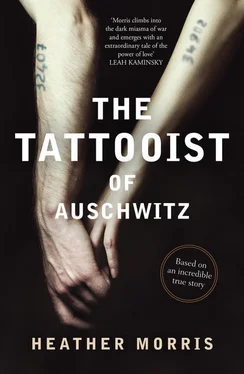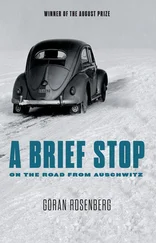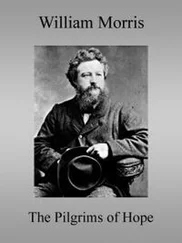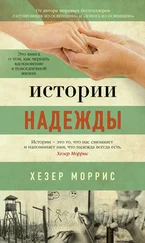‘And at peace,’ a hollow voice adds.
‘These mattresses have got hay in them,’ someone else says. ‘Maybe we should continue to act like cattle and eat that.’
Snatches of quiet laughter. No response from the officer.
And then, from deep in the dormitory, a hesitant, ‘Mooooooo…’
Laughter. Quiet, but real. The officer, present but invisible, doesn’t interrupt, and eventually the men fall asleep, stomachs rumbling.
•
It’s still dark when Lale wakes, needing to take a piss. He scrambles over his sleeping companions, down to the floor, and feels his way to the back of the block, thinking it might be the safest place to relieve himself. Approaching, he hears voices: Slovak and German. He is relieved to see that there are facilities, albeit crude, for them to shit. Long ditches run behind the building with planks of wood placed over them. Three prisoners are sitting across the ditch, shitting and talking quietly to each other. From the other end of the building, Lale sees two SS approaching in the semi-darkness, smoking, laughing, their rifles hung loosely down their backs. The flickering perimeter floodlights make disturbing shadows of them and Lale can’t make out what they are saying. His bladder is full but he hesitates.
In unison, the officers flick their cigarettes up into the air, whip their rifles around, and open fire. The bodies of the three who were taking a shit are thrown back into the ditch. Lale’s breath catches in his throat. He presses his back against the building as the officers pass him. He catches the profile of one of them – a boy, just a bloody kid.
As they disappear into the darkness, Lale makes a vow to himself. I will live to leave this place. I will walk out a free man . If there is a hell, I will see these murderers burn in it . He thinks of his family back in Krompachy and hopes that his presence here is at least saving them from a similar fate.
Lale relieves himself and returns to his bunk.
‘The shots,’ says Aron, ‘what were they?’
‘I didn’t see.’
Aron swings his leg over Lale on his way to the ground.
‘Where are you going?’
‘A piss.’
Lale reaches to the side of the bed, clutches Aron’s hand. ‘Hold on.’
‘Why?’
‘You heard the shots,’ says Lale. ‘Just hold on until the morning.’
Aron says nothing as he clambers back into bed and lies down, his two fists curled against his crotch in fear and defiance.
•
His father had been picking up a customer from the train station. Mr Sheinberg prepared to lift himself elegantly into the carriage as Lale’s father placed his fine leather luggage on the seat opposite. Where had he travelled from? Prague? Bratislava? Vienna perhaps? Wearing an expensive woollen suit, his shoes freshly shined, he smiled and spoke briefly to Lale’s father as he climbed up front. His father encouraged the horse to move on. Like most of the other men Lale’s father ferried around with his taxi service, Mr Sheinberg was returning home from important business. Lale wanted to be like him rather than like his father.
Mr Sheinberg did not have his wife with him that day. Lale loved to glimpse Mrs Sheinberg and the other women who travelled in his father’s carriages, their small hands encased in white gloves, their elegant pearl earrings matching their necklaces. He loved the beautiful women in fine clothing and jewels who sometimes accompanied the important men. The only advantage of helping his father came from opening the carriage door for them, taking their hand as he assisted them down, inhaling their scent, dreaming of the lives they led.
‘Outside. Everyone outside!’
Whistles blow and dogs bark. Sunlight from a clear morning streams through the door into Block 7. The men disentangle themselves from each other, climb down from their bunks and shuffle outside. They stand around just outside the building. No one is prepared to move too far away. They wait. And wait. Those who were shouting and blowing whistles have disappeared. The men shuffle their feet back and forth, whisper to the person nearest them. Looking over at other blocks, they see the same scene being played out. What now? Wait.
Eventually, an SS officer and a prisoner approach Block 7, which falls silent. No introductions are made. The prisoner calls out numbers from a clipboard. The SS officer stands alongside, tapping his foot impatiently, slapping his thigh with his swagger stick. It takes a moment for the prisoners to realise that the numbers relate to the tattoos they each bear on their left arm. When the rollcall is over, two numbers have received no response.
‘You –’ the roll caller points to a man on the end of the row – ‘go back inside and see if anyone is still there.’
The man looks at him with questioning eyes. He hasn’t understood a word. The man beside him whispers the instruction and he hurries inside. A few moments later he returns, holds up his right hand and extends his index and middle finger: two dead.
The SS officer steps forward. He speaks in German. The prisoners have learned, already, to keep their mouths shut and stand obediently waiting, hoping some among them will be able to translate. Lale gets it all.
‘You will have two meals a day. One in the morning and one in the evening. If you survive until evening.’ He pauses, a grim smile on his face. ‘After your morning meal you will work until we tell you to stop. You will continue with the construction of this camp. We have many more people to transport here.’ His smile becomes a proud grin. ‘Follow the instructions of your kapo and those in charge of the building programme and you will see the sun go down.’
There is a sound of clanging metal and the prisoners turn to see a group of men approaching, carrying two cauldrons and armfuls of small metal tins. Breakfast. A few prisoners start to head towards the smaller group, as though to offer assistance.
‘If anyone moves they will be shot,’ barks the SS officer, raising his rifle. ‘There will be no second chances.’
The officer leaves and the prisoner who conducted the rollcall addresses the group. ‘You heard him,’ says the man, in Polish-accented German. ‘I am your kapo, your boss. You will form two lines to get your food. Anyone complaining will suffer consequences.’
The men jockey into line and several start whispering among themselves, asking if anyone has understood what ‘the German’ said. Lale tells those nearest to him and asks them to pass it along. He will translate as much as he can.
As he reaches the front of the line he gratefully accepts a small tin cup, its contents slopping over the rough hands that thrust it at him. He steps aside and examines his meal. It is brown, contains nothing solid and has a smell he cannot identify. It is neither tea, coffee, nor soup. He fears he will bring the foul liquid back up if he drinks it slowly. So he closes his eyes, pinches his nostrils with his fingers and gulps it down. Others are not so successful.
Aron, standing nearby, raises his cup in a mock toast. ‘I got a piece of potato, what about you?’
‘Best meal I’ve had in ages.’
‘Are you always so upbeat?’
‘Ask me again at the end of the day,’ Lale says with a wink. Returning his empty cup to the prisoner who handed it to him, Lale thanks him with a quick nod and half a smile.
The kapo shouts, ‘When you lazy bastards have finished your dining, get back into line! You have work to do!’
Lale passes on the instruction.
‘You’ll follow me,’ the kapo shouts, ‘and you’ll follow the instructions of the foreman. Any slacking off, I’ll know about it.’
•
Lale and the others find themselves in front of a partially erected building, a replica of their own block. Other prisoners are already there: carpenters and bricklayers all quietly labouring in the established rhythm of people used to working together.
Читать дальше






![Хезер Моррис - Дорога из Освенцима [litres]](/books/397846/hezer-morris-doroga-iz-osvencima-litres-thumb.webp)
![Хезер Димитриос - Токсичный роман [litres]](/books/408645/hezer-dimitrios-toksichnyj-roman-litres-thumb.webp)




